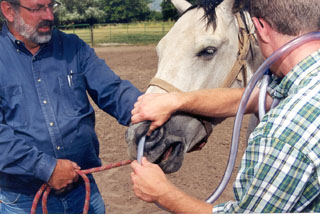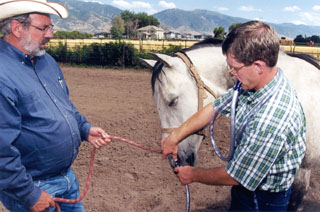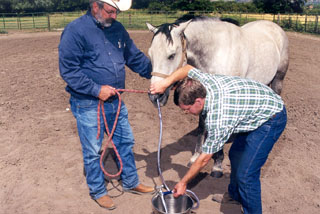This problem is caused by an over-consumption of concentrates. When an over-abundance of
concentrates enter the stomach and intestines, the pH decreases and
certain bacteria proliferate while others die off. As the bacteria change,
toxins are released and are absorbed from the gut. These toxins cause the horse
to be sick and frequently go into shock. Most of the time this problem is
diagnosed because the owner observes or knows the animal has consumed
excessive amounts of concentrates.
Clinical Signs:
- At first, the animal may be lethargic, off feed, and at times, have a
slightly distended abdomen. The gut sounds may be increased (hypermotile) to
decreased (hypomotile). See page B890 for techniques on listening to gut
sounds.
- The animal can have diarrhea that may or may not have blood in it.
- As the problem progresses, the oral membranes can become pale due to toxic
shock.
- In severe cases, the animal may be down and unable to rise.
- Lameness and laminitis are often seen in severe cases.
Treatment:
If grain overload is suspected, a veterinarian should be called. The
veterinarian may administer or advise some or all of the following:
- Banamine, given according to recommendations for endotoxins and pain.
- For any suspect cases, an oral tube should be placed in the stomach and
the following should be administered to the animal:
- One-half to one gallon of mineral oil to
expedite the elimination process and help limit toxin absorption.
- Activated charcoal, given orally to absorb the toxins released in the
gut.
- Walking the horse for a few minutes every 3-4 hours may help keep the
intestines moving. Do not over-exert the horse by walking it too much.
* If the above treatments do not seem to resolve the problem, blood
work may
also be necessary.



